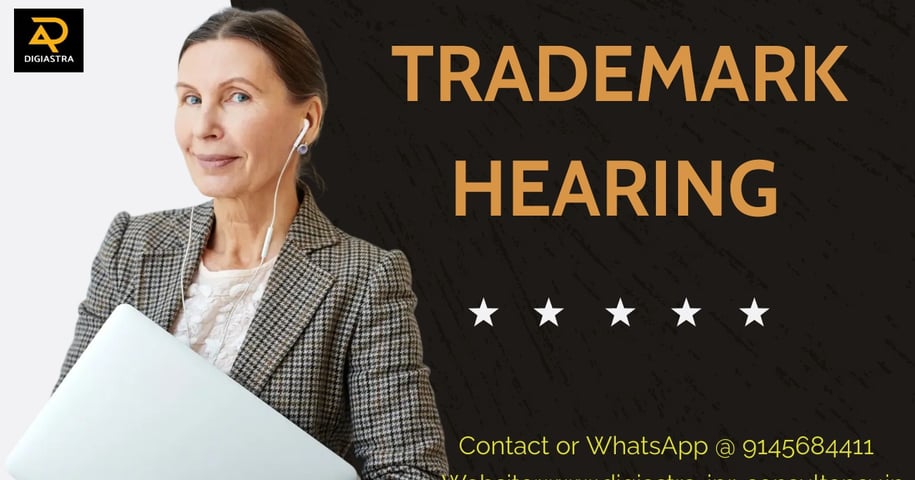Trademark Hearing


Understanding Trademark Hearing in India: A Step-by-Step Guide
Trademark registration is a critical step in securing the legal protection of your brand. However, during the process, it’s common to face objections from the Trademark Registrar. These objections may require you to attend a trademark hearing to defend your application and move towards registration.
In this blog, we’ll explore everything you need to know about trademark hearings in India, including why they happen, how to prepare, and what to expect during the hearing process.
What is a Trademark Hearing?
A trademark hearing is a legal proceeding that occurs if the Trademark Examiner objects to your trademark application during its examination. The hearing provides you an opportunity to present evidence, arguments, or clarifications to overcome the objection and get the trademark approved for registration.
Trademark objections can arise due to:
Similarity with existing trademarks
Use of prohibited or offensive words
Descriptive nature of the trademark
Lack of distinctiveness in the trademark
If the objections are not cleared during the initial stages, a hearing may be scheduled, giving the applicant (or their representative) a chance to present their case before the Registrar.
Reasons for Trademark Hearing in India
There are several reasons why a trademark hearing might be required:
Similarity with Existing Marks: If your proposed trademark closely resembles an already registered or applied mark, the examiner may raise objections. A hearing allows you to demonstrate how your trademark differs.
Descriptive Marks: Trademarks that describe the product or service directly are usually refused. At the hearing, you may need to prove that your mark has gained distinctiveness or secondary meaning over time.
Generic Words: If the trademark consists of common or generic terms, the examiner might object. You’ll need to prove the uniqueness of your mark in context.
Incorrect Classification: Your application may be objected to if the goods or services fall under the wrong classification. During the hearing, you may have to clarify or correct the class.
Steps Involved in Trademark Hearing
1. Receiving the Trademark Examination Report
Once your application is examined, the Trademark Office issues an Examination Report, stating if there are any objections. The report will outline the reasons for objections and provide a deadline for filing a response, usually within 30 days.
2. Responding to Objections
After receiving the Examination Report, you can file a reply to the objections, explaining your stance. If the examiner is satisfied with the written response, the application will proceed without a hearing. If not, a hearing notice will be issued, scheduling a date to attend a hearing.
3. Preparing for the Hearing
Preparing for a trademark hearing is crucial for a successful outcome. The key preparations include:
Gathering Evidence: Collect documentation, such as sales figures, marketing materials, invoices, and customer testimonials, to show that your trademark is distinct or has acquired secondary meaning.
Legal Arguments: If your trademark objection is based on legal grounds (such as similarity with existing marks), prepare your case with sound legal arguments and precedents.
Appointing a Representative: Trademark hearings can be attended by the applicant or their authorized representative, such as a trademark attorney, who has experience dealing with objections and hearings.
4. Attending the Trademark Hearing
On the day of the hearing, the applicant or their attorney presents their arguments and evidence before the Trademark Registrar. Here’s what happens during the hearing:
Presentation of Arguments: The applicant or their representative provides clarifications on the objections raised, with supporting documents and legal references.
Response by the Registrar: The Registrar may ask questions or request additional information, and the applicant must respond promptly.
Outcome of the Hearing: After hearing both sides, the Registrar either allows the trademark to proceed for registration or rejects it. In some cases, the Registrar may request further documentation or schedule another hearing.
5. Post-Hearing Outcome
Once the hearing is concluded, the outcome is communicated to the applicant. There are two possible outcomes:
Acceptance of the Trademark: If the objections are cleared during the hearing, the trademark will proceed for publication in the Trademark Journal, allowing it to be registered after a 4-month opposition period.
Rejection of the Trademark: If the objections are not resolved, the Registrar may reject the trademark application. In such a case, the applicant can file an appeal with the Intellectual Property Appellate Board (IPAB).
How to Prepare for a Trademark Hearing?
To ensure you’re well-prepared for the trademark hearing, follow these tips:
Consult a Trademark Expert: Engaging a professional trademark attorney is essential to navigate the complex objections and present strong arguments.
Review the Examination Report Thoroughly: Understand the reasons behind the objections and prepare your response accordingly.
Gather Sufficient Evidence: Documentation proving the distinctiveness or acquired reputation of the trademark can significantly strengthen your case.
Prepare Legal Precedents: If your objection is based on similarity, prepare references to legal precedents where similar cases were resolved favorably.
Conclusion
A trademark hearing is an integral part of the registration process when objections arise. It provides a fair opportunity for applicants to present their case and overcome objections. Proper preparation and expert guidance are key to ensuring a positive outcome in the hearing.
At DigiAstra Consultancy Services, we specialize in trademark hearings and have a team of experienced professionals who can help you overcome objections efficiently. Contact us today to ensure your brand receives the protection it deserves!
Need assistance with your trademark application or facing objections? Reach out to DigiAstra Consultancy Services for expert guidance and hassle-free trademark registration!
